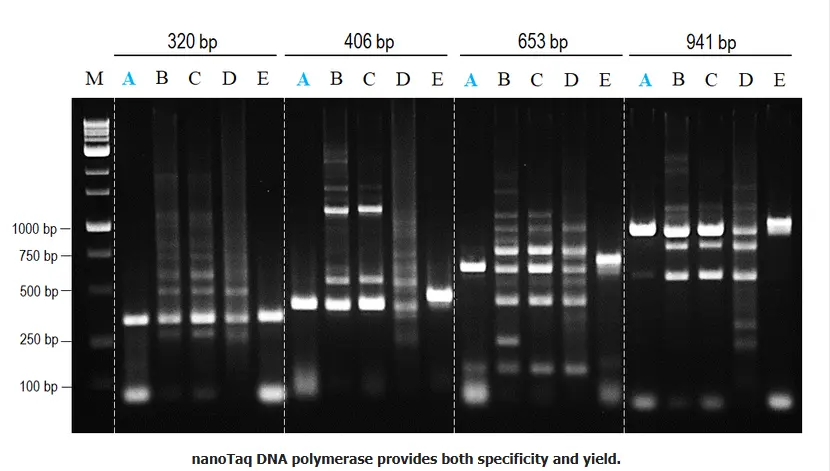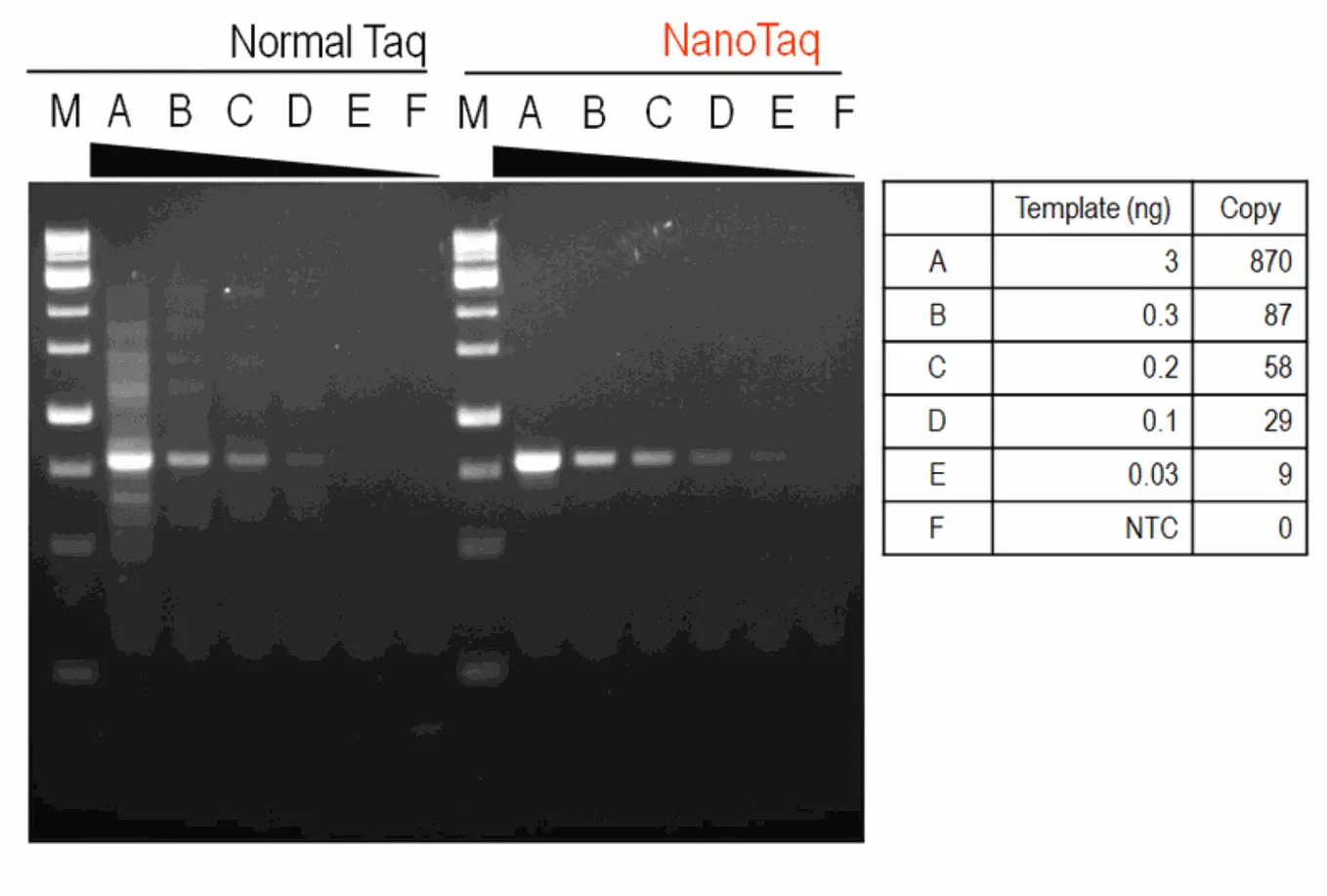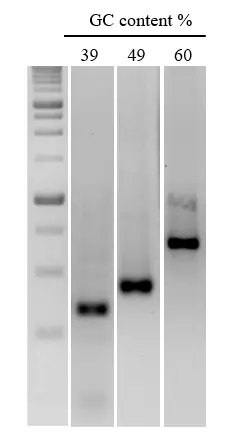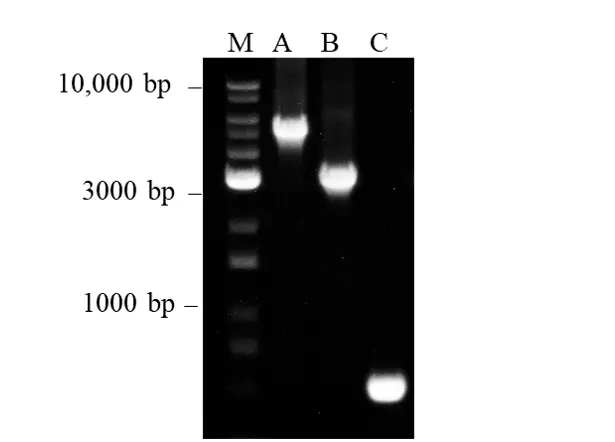nanoTaq Hot-Start DNA Polymerase
Bio-Helix nanoTaq DNA Polymerase is an innovative, enhanced hot-start enzyme designed to provide convenience and reliability in your PCR experiments. Engineered with advanced nanotechnology complexes, nanoTaq offers significant advantages over traditional hot-start polymerases.
- Nano Technology Complex: nanoTaq is designed with cutting-edge nanotechnology to ensure superior performance and reproducibility in your PCR reactions.
- Convenient and Reliable: Performs reliably even at room temperature, requiring no modifications to the conventional PCR protocols and cycling conditions.
- Reduced Nonspecific Primer Annealing: Minimizes non-specific binding and ensures high specificity in your PCR amplifications.
- Enhanced Product Yield: Improves PCR product yield, making it ideal for generating high-quality amplicons.
- Extended Product Size Range: Efficiently amplifies PCR products up to 5kb, offering versatility for a wide range of applications.
Applications :
- Gene amplification
- Cloning and sequencing
- Genotyping
- High-fidelity PCR
- Amplification of larger DNA fragments
Bio-Helix nanoTaq DNA Polymerase is a game-changer in PCR technology, offering high reliability, excellent yield, and versatility for a wide range of applications.
..5
Figure 1. Comparison of Non-Specific Amplifying Effects Across Major Suppliers
All amplifications were carried out following the manufacturer’s guidelines to amplify 320 to 941 bp amplicons from human genomic DNA. nanoTaq Hot-Start DNA Polymerase exhibited superior specificity and yield with minimal band shifting when compared to other commercial antibody-mediated hot-start polymerases. This demonstrates the high-performance capabilities of nanoTaq in producing reliable and accurate PCR products.

A | nanoTaq |
B | Thermo DreamTaq |
C | Thermo DreamTaq HS |
D | Roche KAPA2G HS |
E | Invitrogen Platinum HS |
Empower young minds
Figure 2. Sensitivity and Reliable Amplification from Low Amounts of Input DNA
An 803 bp fragment was successfully amplified from varying amounts of human genomic DNA, including 3, 0.3, 0.2, 0.1, and 0.03 ng, along with a no template control (NTC). All amplifications were performed in 20μL PCR reactions using nanoTaq DNA Polymerase, demonstrating its high sensitivity and reliability even with low amounts of input DNA.

Figure 3. Efficient Amplification of DNA Sequences with a Range of GC Content
A series of DNA fragments with increasing GC content were successfully amplified from human genomic DNA (gDNA). nanoTaq Hot-Start DNA Polymerase was used to efficiently amplify targets with greater than 50% GC content, showcasing its ability to handle challenging sequences with high GC content.
Thermo DreamTaq, Thermo DreamTaq HS, and Invitrogen Platinum HS are registered trademarks of Thermo Scientific™ and Pierce™. Roche KAPA2G HS is a registered trademark of Merck. The trademark holders are not affiliated with Bio-Helix Co., Ltd. and do not endorse these products.

Empower young minds
Figure 4. Inhibitor Resistance of nanoTaq DNA Polymerase
A 280 bp human genomic DNA target was amplified to compare the inhibitor resistance of nanoTaq DNA Polymerase with four leading competing DNA polymerases :
A. Thermo DreamTaq.
B. Thermo DreamTaq HS.
C. Roche KAPA2G HS.
D. Invitrogen Platinum HS.
All amplifications were conducted according to the manufacturer's instructions, with each mixture containing the following inhibitors:
- No inhibitor control
- Bile salts (final concentration of 0.5 mg/mL)
- Heparin (final concentration of 0.5 unit/mL)
- Sodium citrate (final concentration of 150 μg/mL)
- Hemin (final concentration of 0.1 μg/mL)
- Humic acid (final concentration of 1 μg/mL)
The results demonstrate that nanoTaq DNA Polymerase exhibited the best tolerance to humic acid interference, outperforming the major competitors in hot-start DNA polymerase testing. This highlights nanoTaq’s superior inhibitor resistance, making it an optimal choice for challenging DNA amplification conditions.

Empower young minds
Figure 5. Amplification of Long Target DNA Fragments with nanoTaq DNA Polymerase
It is widely recognized that Taq DNA polymerase struggles with amplifying DNA fragments larger than 1 kb due to its error-prone amplification process, which decreases efficiency for longer targets. However, nanoTaq DNA Polymerase overcomes this challenge, effectively amplifying larger DNA fragments with superior performance.
Lane M: 1 kb plus DNA Ladder RTU (DM015-R500)
Lane A: 5 kb
Lane B: 3 kb
Lane C: 0.5 kb Lambda DNA fragment sizes
All amplifications were performed with a 3-minute extension time at 72°C. The results demonstrate that nanoTaq delivers optimal performance for long PCR fragments, showcasing its ability to efficiently amplify larger DNA targets.

